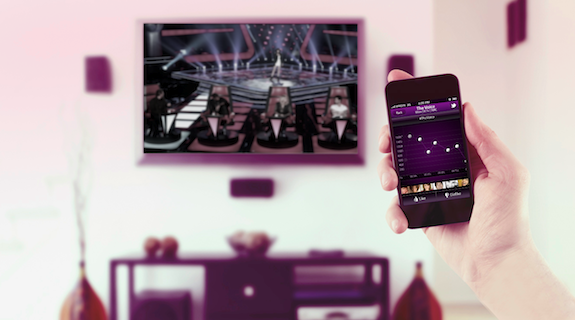In 2012, Rich Santos was vacationing in Hawaii when he stumbled across the VH1 series “Love and Hip Hop Atlanta,” and quickly became hooked. He wanted to express his newfound enthusiasm, however, being a 40-year-old man, he felt embarrassed to talk to his friends about it or post anything on Facebook about it or mention it in any way whatsoever.
Around that same time, the 2012 presidential debates were flaring up, and social media reaction was becoming a guiding force not only on the second screen, but on the main screen as well. According to Santos, it was “one of the first times where you really saw the news channels [airing tweets] and doing real-time self-expression on the screen.” He started to wonder if it was possible to measure all that social buzz – not in terms of volume (plenty of services such as Trendrr already do that just fine) but in terms of overall sentiment. The answer, Santos determined, was yes, and would come in the form of a new app he envisioned that would not only quantify the feelings fans had about their favorite shows, but give him, and other closet fans of embarrassing shows like him, a platform where they could air their sentiment discreetly and effortlessly. Vokl was born.
“You can scroll through a hundred tweets and you’re going to get some negative tweets, some positive tweets, but it’s difficult to see everything as a whole,” Santos, the founder of Vokl, told Brief. “And Nielsen the next day will say, ‘OK, this show had a million tweets’ or whatever. Or, they can show a timeline saying, ‘at this point in the episode, 2 million tweets were sent out.’ But what was the sentiment for that event or toward that brand? We’re trying to see if we can capture sentiment.”
Recently launched in the App Store, Santos’ Vokl is a TV companion app that asks users to register their emotional reaction to a given television show or sporting event by pressing “Like” or “Dislike” at any given moment. “It’s very non-intrusive,” Santos said. “You don’t even have to look at the app, it’s just two buttons at the bottom of the screen.
Enjoy a particularly scintillating plot twist on “Scandal?” Press “Like.” Annoyed by a play called during “Monday Night Football?” Press “Press Dislike.” The app displays the overall sentiment of the given show’s reactions via a real-time “trend line,” – essentially a moving line graph. When lots of people like a show, the line goes up. When they don’t, it goes down.
According to Santos, Vokl is not intended to compete with Facebook or Twitter. Twitter, especially, he said, “is very important to media and doing a great job.” On the contrary, Santos sees Vokl as a sort of stepping stone between TV and other social media. “You don’t have to formulate some profound tweet or something smart on Facebook,” he said. “You’re just registering something positive or negative, and then at that point if you form an opinion you can take it to Twitter [or whatever your chosen platform is.]”
While Vokl is currently experimenting with a rewards system wherein deals pop up based on how long a user engages with the app (as opposed to a check-in or points system favored by established companion apps such as Viggle or GetGlue), Santos sees its main revenue stream eventually stemming from its value as a research tool to broadcasters and other TV providers. The company can provide demographics of its emotion-driven data, showing numbers of likes or dislikes at key moments in a given show, and revealing where those sentiments come from in terms of gender, age and location. Santos believes if his company creates “the best second-screen TV engagement app we can, it will open opportunities to TV distributors, political groups, etc. who want to see the data.” Until then, he said, the goal is to build a devoted user base big enough that its cumulative feelings about television have value. “Our main focus is sentiment and influence as a community.”
Tags:













































__twocolumncontent.jpg)











